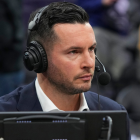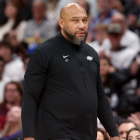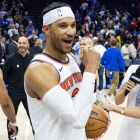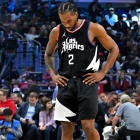Tim Duncan walked away from the NBA on Monday, and he did it in the most fitting way possible. No fanfare, no farewell tour, just a press release that did not even include a quote from Duncan. He didn't even bother to give the requisite quote. He's just gone
In his wake he leaves 19 NBA seasons as one of the finest players in the game from start to finish, one of the best defensive players to ever play the game, five NBA championships, 15 All-Star appearances, 15 All-NBA selections, two MVPs, three Finals MVPs, 15 All-Defensive Team selections, an estimated 750,000 turn-around bank shots and a million exasperated stares after foul calls.
He also leaves with the reputation as the greatest power forward of all time.
That's a lofty title, to be regarded as the best to ever play a specific position in the NBA. It's also tough to discern because Duncan so often played center, especially later in his career. He's most specifically and accurately described as "The Greatest Player To Ever Play Power Forward For Much Of His Career In Both Position And Role." But that's a pretty long title.
The title itself is what most people react to, but with a vector like that, what winds up mattering most is the comparison to the others that would lay claim to the title. So let's take a look.

Tim Duncan, San Antonio Spurs
Peak season (pick one, but we'll go with the championship 2003 season): 23.3 points, 12.9 rebounds, 3.9 assists, 2.9 blocks, 51 percent from the field, 26.9 PER, 7.6 VORP
Accomplishments: Two-time MVP, three-time Finals MVP, 13-time All-Star, 15-time All-NBA selection (tied for most all-time), 15-time All-Defensive Team selection, five-time NBA champion
Karl Malone, Utah Jazz/Los Angeles Lakers
Peak season (1997): 27.4 points, 9.9 rebounds, 4.5 assists, 55 percent from the field, 28.9 PER, 7.9 VORP
Accomplishments: Two MVPs, 14-time All-Star, 14-time All-NBA selection, four-time All-Defense selection, three Finals appearances, second all-time in points (regular season), sixth All-Time in playoff rebounds, seventh all-time in playoff points, seventh all-time in rebounds (regular season)
How he compares to Duncan: Malone held this title prior to Duncan's emergence, and held it for about five years until it became apparent where Duncan already was in the conversation. There are substantial difference in their games and while Malone was a great defender, he was never the all-around hyper-versatile force Duncan was. His offensive game was just as fluid and efficient, though, and he was known to just absolutely demolish defenders for entire games. Malone took the game over in a way Duncan never did... but that was mostly because Duncan never felt the need to. Malone is the only player who can really match up to Duncan at power forward in terms of consistent, long-term greatness. You can make an argument for Malone to stack up with Duncan if you can get past the five rings to none for Duncan. After all, Duncan never played against prime Jordan. But Duncan's overall impact and brilliance seems just a bit higher.
Kevin Garnett, Minnesota Timberwolves/Boston Celtics
Peak season (2004): 24.2 points, 13.9 rebounds, 5.0 assists, 1.5 steals, 2.2 blocks, 49 percent from the field, 25.0 PER, 1.6 VORP
Accomplishments: One MVP award, one Defensive Player of the Year award, 15-time All-Star, nine-time All-NBA selection, 12-time All-Defense selection, two NBA Finals, one championship
How he compares to Duncan: This one is very interesting. If Garnett is the one who winds up drafted by the Spurs, how does his career go? An uncompromising, winning-obsessed maniac who at his peak encompassed seemingly every skill you can imagine, and wound up winning a title with Boston. He is iconic on two franchises, and you cannot fault the Wolves' inability to get past the Lakers in the early aughts on Garnett. Garnett was as good defensively as Duncan was in his prime and a broader threat offensively. Garnett had worse teams around him for his prime and still managed to make his team into a threat. You cannot make the argument that Garnett's play was worse, or better, than Duncan's, only that Duncan's career was greater. The team success matters, though, regardless of context, and it's here that "Yeah, but the five rings," screams loudest.
Charles Barkley, Philadelphia 76ers, Phoenix Suns, Houston Rockets
Peak season (1993, with apologies to 1988): 25.6 points, 12.2 rebounds, 5.6 assists, 1.6 steals, 1.0 blocks, 52 percent from the field, 25.9 PER, 7.5 VORP
Accomplishments: One MVP award, 11-time All-Star, 11-time All-NBA, one NBA Finals, zero championships.
How he compares to Duncan: The Round Mound of Rebounds is simultaneously underrated and overrated in retrospect. Barkley was a monster on the floor, the kind of player who took over games and changed the entire context of the team offensively while shoving it in their faces. His brashness was the exact opposite of what Duncan brought to the game, and their leadership styles were diametric opposites. Of course, so were their defensive games. Barkley often struggled with effort on that end due to his offensive load (and limited explosiveness) while Duncan is one of the best defensive players of all time. The absence of Barkley's championships does ring loudly, though like Malone, he has the benefit of the Jordan excuse.
Elvin Hayes, Houston Rockets/Washington Bullets
Peak season (1974): 21.4 points, 18.1 rebounds, 1.1 steals. 3.0 blocks per game, 42 percent from the field, '18.2 PER, 3.0 VORP
Accomplishments: 12-time NBA All-Star, nine-time All-NBA selection, two-time All-Defensive team, fourth all-time in rebounds, one NBA championship
How he compares to Duncan: "The Big E" was a dominant defensive player to put him in line with Duncan, but was always most notable for his pairing with Wes Unseld on those teams. Hayes also played in an era of compromised play due to the drug problems that were rampant in the league in the early 70's. It's tough to make an argument for Hayes on the same level with Duncan.
Kevin McHale, Boston Celtics
Peak season (1987): 26.1 points, 9.9 rebounds, 2.6 assists, 60 percent from the field, 24.0 PER, 5.6 VORP
Accomplishments: Seven-time All-Star, one All-NBA selection, six-time All-Defensive Team, two-time NBA Sixth Man Award winner, three-time NBA champion
How he compares to Duncan: McHale has the stats, but he doesn't have the accolades. He was a member of one of the greatest teams ever, the 1987 Celtics, which gives him a push, but he also wasn't the best player on that team. If Tim Duncan had played with Larry Bird or Michael Jordan or even LeBron James, his career might have looked like McHale's. But McHale's mental presence was always different despite his being a fiery competitor, and he was just built differently. McHale is one of the true greatest, but doesn't reach Duncan levels.
Dirk Nowitzki, Dallas Mavericks
Peak season (2007, with apologies to 2011): 24.6 points, 8.9 rebounds, 3.4 assists, 27.6 PER, 6.2 VORP
Accomplishments: One MVP, one Finals MVP, 13-time All-Star, 12 All-NBA selections, one NBA championship
How he compares to Duncan: Duncan's primary rival for nearly a decade through the 2000's, and the greatest European NBA player of all time. You can make a relevant case for Nowitzki given how important he was to the Mavericks, how great their 2007 season was before the disaster vs. Golden State, how legendary their 2011 championship was, and the like. But Nowitzki's defense was never anywhere close to Duncan's, and Duncan remained a crucial and vital reason for the Spurs' elite success from the time he was drafted until the time he retired. Duncan wins out there as well.






















